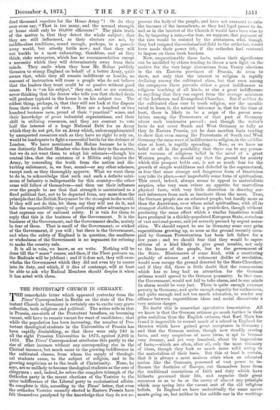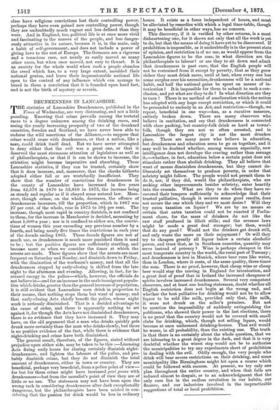THE PROTESTANT CHURCH IN GERMANY.
THE remarkable letter which appeared yesterday from the Times' Correspondent in Berlin on the state of the Pro- testant Church in Germany is certainly one to excite very grave reflection, both religious and political. The writer tells us that in Prussia, one-sixth of the Protestant benefice; on becoming vacant, will have to remain vacant for want of candidates ; that while the population has been increasing, the number of Pro- testant theological students in the Universities of Prussia has been rapidly diminishing, so that there were only 740 in all the eight Prussian Universities in 1873, against 2,203 in 1831. The Times' Correspondent attributes this -partly to the rise of other incomes without any corresponding rise in the Clerical incomes, but much more to the growing indifference in the cultivated classes, from whom the supply of theologi- cal students came, to the subject of religion, and to its growing scepticism as to the truth of Christianity. None, he says, are so unlikely to become theological students as the sons of clergymen ; and, indeed, he refers the complete triumph of the Orthodox party in the recent elections of the Vestries to the utter indifference of the Liberal party to ecclesiastical affairs. So complete is this, according to the Times' letter, that even the orthodox Vestries recently elected in Eastern Prussia have felt themselves paralysed by the knowledge that they do not re-
present the body of the people, and have not ventured to raise the incomes of the incumbents, as they had legal power to do, and as in the interest of the Church it would have been wise to do, by imposing a rate,—for fear, we suppose, that payment of the rate would be resisted by the abstainers, who, though they had resigned the ecclesiastical field to the orthodox, would have made their power felt, if the orthodox had ventured to impose on them fresh burdens.
Now, unquestionably these facts, unless their significance can be modified by others tending to throw a new light on the motive for the very large abstentions from Vestry elections in the six Eastern provinces of Prussia, do seem to show, not only that the interest in religion is rapidly declining among the cultivated class, but that even among the ratepayers there prevails either a great indifference to religious teaching of all kinds, or else a great indifference to anything that they can expect from the average ministers of the Lutheran and Evangelical Churches. But if neither do the cultivated class care to teach religion, nor the unculti- vated to learn it, the natural inference is, that for the time at least, there is likely to be a reign of the purest secu- larism among the Protestants of that part of Germany where such tendencies prevail ; and though the writer's facts do not cover South and West Germany as fully as they do Eastern Prussia, yet he does mention facts tending to show that even among the Protestants of South and West Germany the same wave of indifference to religion, in the middle-
class at least, is rapidly spreading. Now, as we have no belief at all in the possibility that there can be any perma nent vacuum of religious belief in the mind of a great Western people, we should say that the ground for anxiety which this prospect holds out, is not so much fear for the growth of simple worldliness and disbelief in the supernatural, as fear that some strange and dangerous form of fanaticism may take its place,—not improbably some form of spiritualism. This creed, indeed, always seems to appeal to materialistic sceptics, who very soon evince an appetite for marvellous physical facts, with very little discretion in drawing cor- rect inferences from such as fascinate them the most. True, the German people are an educated people, but hardly more so than the Americans, over whose mind spiritualism, with all its strangest diablerie, has run like a prairie-fire, though without producing the same effect which a similar fanaticism would have produced in a thickly-populated European State, conscious of vast national power, and yet severely pressed by urgent neces- sities. We should expect to see in Germany some very grim superstitions growing up, so soon as the ground recently occu- pied by German Protestantism has been left fallow for a few years ; and we should fear that they would be super. stitions of a kind likely to give great trouble, not only to the homes of the people, but to the government- of the State. Missionaries of some kind, with a smattering probably of science and a vehement dislike of revelation, would soon occupy the ground deserted by the State Churches; and if they did, there is little doubt that the communism which has so long had an attraction for the German artisans would spread to the German peasantry. In that case, the Government, would not fail to take alarm, and to our minds its alarm would be very just. There is quite enough extreme poverty in Germany, and quite enough capacity for enthusiasm; and quite enough and not too much education, to render any alliance between superstitious ideas and social discontents a very serious danger. . No doubt this is somewhat speculative lamentation. All we know is that the German artisans go much further in their grim socialism than the English artisans, that Karl Marx has found it impossible to recruit much of a school in England for theories which have gained great acceptance in Germany ; and that the German nation, though now steadily craving facts, and very suspicious of mere ideas, is apt to become very dreamy, and yet very fanatical, about its impressions of facts,—which are often, after all, only the most visionary of ideas, though they look so much more solid owing to the materialism of their basis. But this at least is certain that it is always a most anxious crisis when an educated nation like the Germans, possessed of vast power to in. fluence the destinies, of Europe, cut themselves loose from the traditional convictions of faith and duty widish have hitherto governed their life, and organise their great resources so as to be at the mercy of almost any.principle which may spring into the vacant seat of the old religious beliefs. In England we have undoubtedly the same move- meats going on, but neither in the middle nor in the working-
class have religious convictions lost their controlling power, perhaps they have even gained new controlling power, though they are 'undoubtedly much vaguer and less defined than they were. And in England, too, political life is at once more vivid and fascinating to the masses of the people, and less danger.. ously attractive in its nature, because it is, in the main, only a habit of self-government, and does not include a power of giving laws to the rest of Europe. The Germans are a vigorous and a tenacious race, not nearly so easily moved as many other races, but when once moved, not easy to thwart. It is an anxiety for the whole world when such a people abandon the creed which has, to a very large extent, moulded their national genius, and leave their impressionable national life open to the control of any influence which can manage to breed in them a conviction that it is founded upon hard fact, and is not the birth of mystery or reverie.







































 Previous page
Previous page